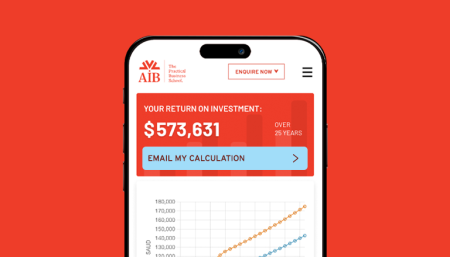Top 7 paying jobs with an MBA degree

One of the most compelling reasons to pursue a Master of Business Administration degree is the higher earning potential through career advancement. An MBA sharpens business acumen, builds advanced skills and expands professional networks, opening doors to some of the highest-paying jobs in Australia across a range of industries.
In this blog, we explore seven high-paying MBA careers, outlining what each role involves, how an MBA adds value and the potential salary. From executive leadership to communications and sales, MBA graduates are well-positioned to confidently step into senior roles with significant salaries.
All salary data is sourced from Hays Salary Guide FY24/25, Australia and New Zealand’s most comprehensive guide to salary and recruitment trends, and is listed in AUD.
Chief Executive Officer (CEO) or Managing Director (MD)
For those seeking the highest level of both responsibility and reward, CEO and MD roles represent the pinnacle of leadership. They are responsible for overseeing all aspects of operations and executing the overall strategic direction of the business. As the primary representative of the company to stakeholders, partners and the broader community, they also play a key role in the company’s reputation and market position.
An MBA can be highly valuable for aspiring CEOs or Managing Directors by providing a comprehensive understanding of core business functions which leads to more informed and effective decision-making at the top level. An MBA also enhances the ability to manage risk, lead change and align business strategy with market opportunities.
For CEOs and managing directors in commercial organisations with turnovers between $50-$500m, the typical income is $600k and can reach up to $700k. For smaller companies with turnovers less than $50m those salaries average at around $350k for CEOs, although can reach up to $450k.
Chief Operating Officer (COO)
Similarly to the CEO, the COO plays a critical role in organisational leadership and is paid accordingly. The COO is responsible for overseeing the day-to-day operations of an organisation and ensuring they align with the company’s strategic goals. Working closely with the executive team, the COO manages key functions such as operational efficiency, process improvement and resource planning across departments.
An MBA is especially valuable for COOs because it offers a broad understanding of business operations, organisational leadership, and strategic resource management. The degree sharpens analytical skills and problem-solving abilities, helping COOs manage risk and optimise operational performance effectively.
In commercial organisations with turnovers between $50 million and $500 million, COOs typically earn around $500k, with some salaries reaching up to $600k. In smaller commercial companies with turnovers under $50 million, COO salaries can be up to $300k.
Chief Procurement Officer (CPO)
Remaining in the c-suite but moving into logistics, the CPO plays a strategic role managing and optimising a company’s supply chain activities. While responsible for procurement operations, the CPO’s work extends to aligning supplier relationships and purchasing strategies with broader business goals to drive cost savings and value creation.
For senior procurement professionals, an MBA supports the shift from operational delivery to strategic leadership. It builds core capabilities in financial management, risk analysis and leadership which supports better decision-making and stronger supplier management. It also helps CPOs engage confidently at executive level and influence broader business priorities.
The earning potential for CPOs is strong, with average salaries around $300,000 and top roles reaching up to $450,000.
Chief Financial Officer (CFO) or Financial Director
CFO and Financial Directors are key executives responsible for managing the financial strategy, budgeting and forecasting, ensuring compliance across all financial activities. The CFO works closely with the executive team to align financial goals with business objectives and drive sustainable success.
The 2024 Crist|Kolder Volatility Report found that more CFOs in Fortune 500 and S&P 500 companies hold an MBA degree than industry-standard CPA credentials, highlighting the relevance of the degree for financial leaders. AIB students have the option to specialise their MBA in Finance with subjects including Corporate Finance, Investment Management and Financial Market and institutions. These Finance subjects can also be chosen as electives in the general MBA.
CFOs and Financial Directors in commercial organisations with turnovers between $50-$500m typically earn around $450k but can reach up to $600k. For companies with turnovers less than $50m those salaries average at around $270k.
Chief Human Resources Officer (CHRO) or HR Director
The Head of HR plays a critical leadership role in shaping an organisation’s people and culture strategy. They are responsible for driving talent acquisition and development, overseeing employee relations and ensuring compliance with employment laws.
AIB offers a specialised Human Resource Management MBA with subjects such as Strategic Human Resource Management, Managing Change, Managing People in a Global Context and Organisational Learning and Development. It provides the advanced skills needed to lead transformation, influence culture and align HR practices with business goals, bridging the gap between tactical HR work and strategic leadership. Both our general MBA and the MBA (Human Resources Management) are accredited by the Australian HR Institute, highlighting their quality and industry alignment.
The Head of HR in an organisation of over 1000 employees can earn up to $400k with a typical salary of $290k. The salary can be as high as $280k for organisations of 250 to 1000 employees and $245k for less than 250 employees.
Executive Director of Communications
Within marketing, public relations and communications roles often brings the highest pay, with Executive Directors of Communications having the greatest salary potential. This role is responsible for managing media relations, engaging with key stakeholders protecting the organisations reputation, leading crisis response and ensuring communications alignment with business strategy.
An MBA equips communication leaders with a strong understanding of business strategy, organisational behaviour and knowledge of different business functions – essential knowledge for aligning communication initiatives with corporate objectives. Additionally, in organisations where communications play a central role in reputation management or stakeholder engagement, an MBA can improve critical thinking and strategic capabilities.
In Sydney, salaries for top Executive Director of Communications roles can be as high as $350k, while Directors without the executive title can earn up to $275k.
Sales Director or General Manager (Sales)
Sales Directors and General Managers (Sales) are senior leaders who play a key role in driving business growth. While they have different day-to-day roles, they are both responsible for ensuring for commercial performance that supports the company’s long-term vision and competitive position.
For aspiring sales leaders, an MBA builds commercial and strategic skills that go beyond sales performance preparing them for broader management roles. It provides a deeper understanding of leadership, market dynamics and financial management enabling sales professionals to lead high-performing teams and drive revenue growth.
Australia’s top sales roles are Sales Directors and General Managers, particularly within FMCG, Consumer Goods, Industrial and Technical Sales sectors. In these areas, General Managers and Sales Directors can earn up to $350k, compared to a typical salary of $250k for a Sales Director in other industries.
If you’re looking to advance your career and grow your earning potential, an MBA could be a powerful step to long-term success. The AIB MBA is designed for working professionals – flexible, practical and focused on real-world business challenges. Invest in your future and check your eligibility for the AIB MBA today.
All salary data in this article comes from The Hays Salary Guide, the largest employment survey with more than 15,000 responses from professionals. All salaries listed are in AUD and are exclusive of superannuation. Figures are correct as of June 2024 and may not reflect future increased to minimum award wages. Completing an MBA does not guarantee these salaries.





